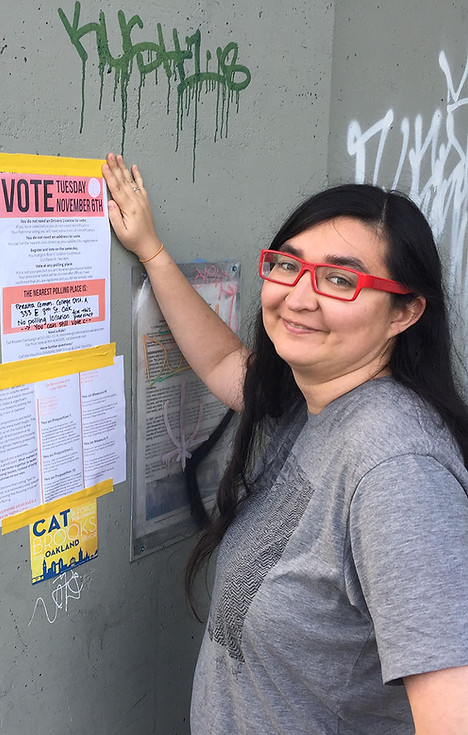Video Producer | Documentary Filmmaker
FEATURED STORIES
Oakland North, November 2018
Nearly 2,000 Oakland residents are homeless and another thousand live in shelters. This fall, volunteer groups from across the city worked on the first-ever drives to register as many of them as possible so they can vote.
“Voting is necessary because our voices are so seldom heard,” said Mavin Griffin, who has been unhoused for a decade and founded the Wood Street encampment for the homeless in West Oakland, where she now lives.
One voter registration drive recruited 25 to 30 volunteers and put them through voter registration training with the Registrar of Voters. The drive was the result of a partnership between Alameda County Voting Matters, an initiative by the Alameda County Public Health Department, and Healthcare for the Homeless, a program of the Alameda County Health Care Services Agency. The volunteers reached out to as many as 500 to 600 homeless people living in Oakland and registered 75 of them.


Medium, November 2018
San Francisco State University is home to the country’s first College of Ethnic Studies. Last Tuesday evening, a panel discussion commemorated the 50th anniversary of the historic five-month long student-led strikes that led to the institution of the college.
“We have a College of Ethnic Studies, which remains the first and only in the nation,” said panelist Penny Nakatsu, who was among those leading the strikes, and co-founded the Asian American Political Alliance (AAPA) chapter in 1968 at what was then called the San Francisco State College, with an aim to politically and socially unite the Asian American students.
The panel was hosted by the California Historical Society at their headquarters in San Francisco. The event was organized in association with Shaping San Francisco and the Museum of African Diaspora. The eight-member panel included activists and scholars who led and participated in the strikes, Ethnic Studies teachers from San Francisco Unified School District (SFUSD), and an Ethnic Studies Lecturer from UC Berkeley.
The Chautauquan Daily, August 2019
In 2012, Eliza Evans took a drawing class at her local community college and began her journey as an artist.
“I am not a frustrated lifelong artist,” she said. For Evans, an economic sociologist by training, “art is a venue to explore the world.”
The “Time Machine” she has created offers an experiential touch-point to the widening discourse on climate change, simulating what Evans speculates the world could feel like in the year 2300.

The Chautauquan Daily, July 2019
When J. Ekela Kaniaupio-Crozier was growing up, her grandmother gave her a gift she would treasure for the rest of her life. Years later, Kaniaupio-Crozier is taking that gift — her native language — and sharing it with the world.
Kaniaupio-Crozier has spent the last 40 years working to make Hawaiian language and culture reach beyond her home state.
“Language is such a driver for people to recognize the heart of a culture; they begin to have an empathy for our people, just because the language has been shared,” said Kaniaupio-Crozier, who helped the language learning app and website Duolingo develop its ‘Ōlelo Hawai‘i curriculum. “The more and more we share on whatever platform, more opportunity we have to share our culture.”


